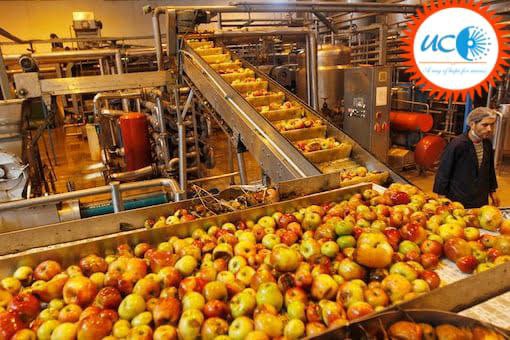India is one of the largest producers of food, yet the Food Processing Industry (FPI) is not well developed in the country. Examine the inhibiting factors and recommend some remedial actions to promote FPIs.
Approach:
- Introduce the answer with defining the FPIs.
- In the body of the answer, highlight the various factors inhibiting the growth of FPI.
- In the next part of the body, discuss various remedial measures to promote FPIs. Conclude by highlighting the need to tackle the issue of FPI with urgency as it tackles issues of poverty, malnutrition and food insecurity.
Food Processing Industry (FPI) is a sector where raw edible products from agriculture, animal husbandry, fisheries etc., are processed through industrial processes into high value-added products. India’s status as a major producer of food (second largest producer of rice and vegetables) provides convergence for growth of agriculture and FPI.
While FPI is a sunrise sector of the economy, contributing 1.69% of the total GVA, FPI is not well- developed in the country due to following inhibiting factors:
- Supply side issues:
a.Perishability of vegetables, vagaries of weather make the availability of consistent quality raw materials difficult. E.gPrice volatility of tomatoes and potatoes may affect the ketchup and chips industries.
b.Infrastructure gaps such as poor roads, lack of cold chain network etc. cause supplychain disruptions. E.g., as per NITI Aayog report annual post-harvest losses are close toRs 90,000 crore.
2.FPI has a huge concentration of unorganized segments (almost 75% firms across all product categories) leading to inefficiency.
3.Issues of ease of doing business such as bureaucratic red-tapes and tedious licensing policy have been major hindrances to establishment of FPIs in India. Eg: large number of forms associated with FSSAI licenses.
4.Lack of seamless Linkage between farms and FPIs due to dependence on APMCs has increased the cost of production.
5.Cultural preferences in India where people prefer homemade/fresh food rather than processed/canned food has made it difficult for the FPI to thrive.
In order to give a boost to the FPIs, there is a need to take certain remedial actions, such as:
- Establish risk sharing mechanisms through private sector participation, fiscal incentives and partnership models to create infrastructure for logistics, storage and processing. Pradhan Mantri Kisan Sampada Yojana (PMKSY) is a welcome step.
- There is need to encourage academia and industry to commence courses in food packing, processing, biotechnology for constant supply of skilled manpower.
- There is a need to develop regulatory framework for contract and corporate farming. Model land leasing Act 2016, model contract farming act, 2018 are steps in the right direction.
- In order to make India a global hub for the food processing industries, there is a need to emulate global best practices. In this regard, coordination between likeminded countries should be ensured.
- Village-level procurement centres for perishables such as fruits, vegetables and dairy should be increased. Eg: Effective and timely upgradation of 22,000 rural Haats into Gramin Agriculture Markets (GrAMS).
- There is a need for the government to provide conducive policy environment. Initiatives like extension of Operation Greens (OG) Scheme to address distress of farmers of perishable fruits and vegetables, setting up of the Grievance Cell of MoFPI to support the industry with issues related to agri-food sector due to COVID-19 etc., are steps in right direction.
FPI will not only serve the nutritional needs of New India but it will also act as an important link in doubling the farmer’s income. The target of ensuring food security for more than a billion people requires a concerted effort by all stakeholders including government and the food processing industry. Progressive steps like Production Linked Incentives and PM-Formalisation of Micro Food Processing Enterprise Scheme (PMFME) for providing financial and technical support should be encouraged.









